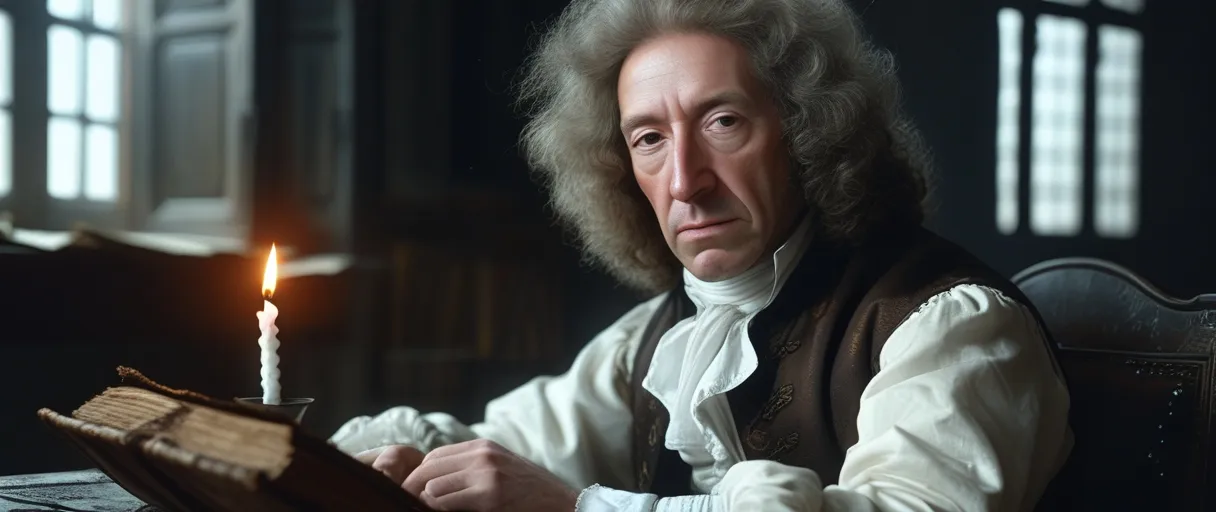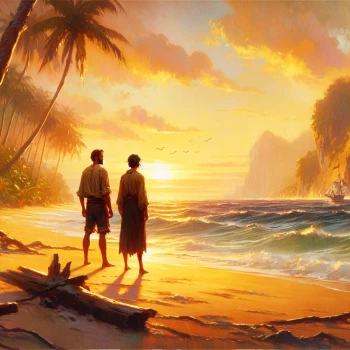
Daniel Defoe
Daniel Defoe was an influential English author of the Enlightenment best known for Robinson Crusoe, a novel celebrated for its exploration of self-reliance, moral introspection, and societal critique.
Full Name: Daniel Defoe
Born: Family Residence, London, United Kingdom on September 13th, 1660
Notable Works
Daniel Defoe remains one of English literature's most enduring figures, widely celebrated for his pioneering novel, Robinson Crusoe. Often hailed as the first English novel, Robinson Crusoe masterfully blends adventure and realism, establishing the genre of realistic fiction. The novel captivates readers with themes of survival, self-reliance, and human resilience, vividly portrayed through the experiences of its protagonist, Robinson Crusoe, who is shipwrecked and marooned for decades on a remote island. Another notable work, The Further Adventures of Robinson Crusoe, further explores Crusoe's life after leaving the island, continuing Defoe's exploration of adventure, personal growth, and human adaptability. Defoe's insightful storytelling and realistic depiction of characters, notably Crusoe and his loyal companion, Friday, have left an indelible mark on literature, inspiring countless adaptations and influencing generations of writers. His narratives remain compelling, rich in detail, and deeply reflective of the human spirit's enduring strength and adaptability.
Books by Daniel Defoe
Overview & Analysis
Daniel Defoe was an English author whose work profoundly captured the intellectual spirit of the Enlightenment, emphasizing rationality, individual moral judgment, and societal critique. Best known for his seminal novel Robinson Crusoe, Defoe masterfully portrayed the psychological depth and resourcefulness of his characters, notably Crusoe himself, whose experiences on a remote island vividly symbolize human resilience, self-reliance, and moral evolution. Through allegory and adventurous narratives, Defoe explored themes such as the critique of social norms, skepticism toward institutional authority, and the virtue of personal integrity. His incisive observations of class structures and colonialism were subtly woven into stories that remain engaging and relevant.
Defoe's literary style combined realism with vivid storytelling, pioneering the novel as a form of psychological and ethical inquiry. His works have had an enduring influence, inspiring generations of readers and writers by championing intellectual freedom, ethical autonomy, and emotional honesty. Ultimately, Defoe's legacy lies in his profound exploration of the human condition, challenging readers to critically examine society and themselves.
Back to TopInfluences & Worldview
Daniel Defoe was deeply influenced by the intellectual currents of the Enlightenment Era, reflecting a worldview that combined rational exploration with an incisive critique of social norms and institutional structures. A philosophical thinker who emphasized individual moral judgment, Defoe's narratives often depicted characters undergoing profound internal moral evolution, navigating ethical dilemmas in extraordinary circumstances. His works repeatedly highlight the virtues of personal integrity, self-reliance, and pragmatic reasoning over blind conformity.
With a sharp eye for societal critique, Defoe employed allegory and symbolism extensively, exploring psychological complexity and human resilience. He was critical of rigid class structures and authoritarian governance, advocating instead for tolerance, intellectual freedom, and ethical autonomy. His writings embody a tension between enthusiasm for technological innovation and cautious skepticism towards unchecked ambition. Through his expressive and character-driven storytelling, Defoe encouraged readers towards emotional honesty, sincerity, and critical introspection, leaving a lasting impression on literary traditions and social thought.
Relevant Historical Events
- Age of Exploration (1400 – 1700): An era characterized by extensive overseas exploration by European powers, leading to the discovery of new lands, maritime trade routes, and cultural exchanges.
- Rise of British Colonialism (1600 – 1800): The expansion of British empire-building efforts across the globe, marked by territorial acquisitions, trade monopolies, and establishment of colonies.
- European Enlightenment (1685 – 1815): The European Enlightenment was an intellectual and philosophical movement emphasizing reason, individualism, and skepticism towards traditional doctrines. It fostered significant developments in philosophy, politics, ethics, and education, inspiring democratic reforms and secular governance.
Notable Characters
Daniel Defoe is renowned for creating resilient, enterprising characters who embody themes of survival, self-reliance, and exploration. Among his most notable creations is Robinson Crusoe, the protagonist of the eponymous novel, whose tale of isolation and ingenuity on a deserted island symbolizes the human capacity for endurance, adaptation, and spiritual reflection. Crusoe's character illustrates Defoe's Enlightenment-era worldview, highlighting rationalism, individualism, and the triumph of reason over adversity.
Another significant figure is Friday, Crusoe's loyal companion, whose portrayal explores themes of colonialism, cultural exchange, and the complex dynamics of power. Through Friday, Defoe examines European attitudes toward indigenous peoples, reflecting the historical context of British colonial expansion and the Age of Exploration.
Defoe's characters typically face challenging circumstances that test their moral fiber and practical intelligence, mirroring contemporary societal shifts and intellectual movements. His protagonists often represent the ideals and tensions of their time, illustrating the author's keen interest in human behavior, societal progression, and the transformative effects of exploration and discovery.
Back to TopThemes of Focus
Daniel Defoe's literary works predominantly explore themes of survival, isolation, and human resilience in the face of adversity. His novels often highlight the individual's struggle against harsh, uncharted environments, epitomized by Crusoe's solitary ordeal on a remote island. This recurring motif serves as a reflection on self-reliance, ingenuity, and the human capacity to adapt and flourish, even under dire circumstances.
Another significant theme in Defoe's writing is colonialism and the complexities of cultural encounter. His narratives investigate the dynamics between European explorers and indigenous peoples, raising critical questions about power, morality, and the consequences of imperial expansion. These themes resonate with historical contexts such as the Age of Exploration and the rise of British colonialism, periods characterized by extensive maritime exploration and territorial conquest.
Secondarily, Defoe touches upon spiritual redemption and moral introspection, often portraying his protagonists' inner journeys toward self-awareness and spiritual awakening. These introspective elements reinforce his primary themes, underscoring the deeper moral and existential challenges faced by individuals confronting isolation and adversity.
Back to TopLegacy & Impact
Daniel Defoe's literary legacy endures prominently through his pioneering work in the English novel, particularly his landmark book, Robinson Crusoe. Often credited with helping establish the modern realist novel, Defoe's innovative narrative techniques, detailed characterization, and exploration of psychological depth have significantly influenced literary traditions. His compelling portrayal of individual resilience, human ingenuity, and moral introspection continues to resonate, keeping themes of self-reliance, survival, and ethical autonomy relevant in contemporary discourse.
Defoe's works have sparked lasting discussions on colonialism, individualism, and societal norms, critically examining the implications of isolation and cultural encounters. His characters, notably Robinson Crusoe and Friday, remain iconic in literature, embodying complex dynamics of power, identity, and moral evolution. Academically, Defoe's writings are widely studied for their philosophical and sociopolitical insights, appearing frequently in educational curricula worldwide. Additionally, numerous adaptations across film, television, and theater attest to his enduring cultural impact.
However, Defoe's legacy has also invited controversy and reevaluation, particularly regarding colonialist attitudes and racial representation, prompting ongoing scholarly debate and critical reassessment of his ideological perspectives in modern contexts.
Back to TopConclusion
Daniel Defoe's writings continue to resonate profoundly in contemporary society, offering timeless insights into human nature, morality, and resilience. His emphasis on individual moral judgment and ethical autonomy has significantly influenced literary traditions, setting a lasting precedent for character-driven narratives that explore profound psychological complexity. Defoe's ability to critique authoritarian governance, rigid social norms, and unchecked ambition through engaging allegory and symbolism ensures his work remains relevant in addressing modern societal challenges.
Readers today will find in Defoe's stories a valuable mirror, reflecting ongoing questions about integrity, personal freedom, and societal responsibility. His exploration of emotional honesty and the virtues of pragmatic reasoning provides meaningful guidance in navigating contemporary ethical dilemmas. By revisiting Defoe's narratives, modern audiences gain not only literary enrichment but also enduring wisdom that continues to resonate deeply with the human experience.
Back to Top
